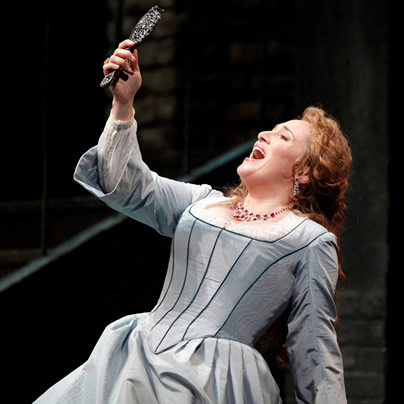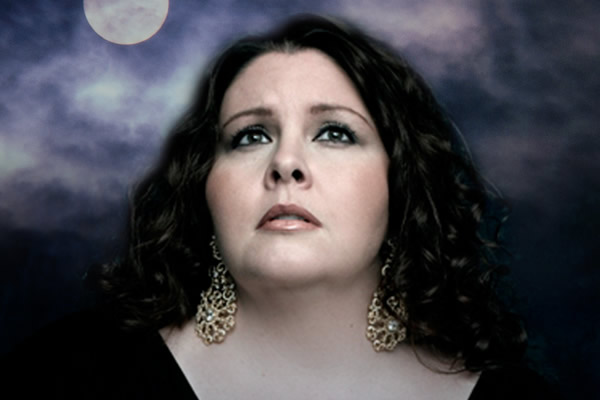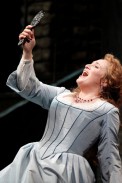Arts & Entertainment
Opera: Girl drama
Washington opera’s spring season features plum roles for women


Angela Mead in a promo photo for ‘Norma.’ (Photo by Dario Acosta; courtesy WNO)
Kennedy Center Opera House
2700 F St., NW
Tickets: $25-$300
202-467-4600
kennedy-center.org
This spring at Washington National Opera, the fairer sex will be the talk of the capital’s operatic scene. From stars to directors and the repertoire itself, women rule the stage, with exciting company debuts as part of the stable.
First out of the gate, opening Saturday, is “Manon Lescaut,” starring Washington favorite Patricia Racette in the title role. Last seen on the Kennedy Center’s opera stage in 2011 for “Iphigenie en Tauride” and “Tosca,” Racette (a lesbian) will be tackling the role of Manon Lescaut for the first time in the revival of gay director John Pascoe’s 2007 production.

Patricia Racette in the title role for ‘Manon Lescaut.’ (Photo by Cory Weaver; courtesy WNO)
Written by Giacomo Puccini and premiered in 1893, “Manon Lescaut” was a risky undertaking for the composer. Almost a decade earlier, Frenchman Jules Massenet had unveiled a wildly popular version of the same story, simply titled “Manon.” Up to this point in his career, Puccini hadn’t been particularly successful, but “Manon Lescaut” put Puccini on the operatic map.
For many of his operas, Puccini’s heroine is the crux of the drama, and “Manon Lescaut” set the bar for this winning equation. At the opera’s start, the young and achingly beautiful Manon is on her way to a convent at her family’s insistence. Her carriage stops in a small town for a rest, where she meets the young and handsome Des Grieux. After he professes his undying love for her, she decides to run away with him, whether for love or a convenient escape is up for debate.
At the start of the second act, time has passed and Manon has cashed in her chips for money and comfort instead of love. She’s now the kept woman of an older wealthy man, and although she has everything she could ever dream of, she pines for Des Grieux. Eventually, the young pair manages to reconnect with disastrous results, including an appropriately operatic death scene for Manon.
One of the greatest tests of an operatic soprano is the titular role of “Norma.” Divas from Rosa Ponselle to Maria Callas and Joan Sutherland have made the Druid priestess their calling card, and now, rising soprano Angela Meade steps up to the plate for her first full production of this titanic role.
Audiences and critics have long been anticipating this moment with a mixture of hopeful curiosity and timidity. In July of 2010, Meade sang the role in a concert version, and while the reviews were generally kind, many felt it was too much too soon for the young soprano. Cut to February 2012 when a more seasoned Meade, on the heels of winning the Beverly Sills Artist Award, received glittering notices for her performance at the Metropolitan Opera in Verdi’s “Ernani.” Starting March 9, the soprano makes another run at Norma in a new production, directed by out theater and opera director Anne Bogart.
“Norma” is a tale of betrayed love and, ultimately, redemption, headed by the priestess of the title. The ancient Celts, under Roman occupation, are biding their time to destroy the southern interlopers until Norma gives her consent.
She’s been delaying, though, because she’s fallen deeply in love with the Roman general and has secretly born him two children.
As men are wont to do, the Roman falls in love with another priestess, leaving Norma in the emotional lurch. The opera ends in a spectacularly heartbreaking climax between Norma, her former lover and her father who is shocked to learn of Norma’s transgression. Written by Vincenzo Bellini and premiered in 1831, “Norma” has persevered in the repertoire because of its interpreters. This spring, we’ll see if Angela Meade makes it her own.
Later in spring, comes the final offering of the opera’s season, the American musical “Show Boat,” a piece that has long straddled the line between opera and musical theater. This new production, opening May 4, will be directed by Washington National Opera’s new artistic director, Francesca Zambello, who started her tenure as artistic director in January.
Jerome Kern’s musical masterpiece features songs that have become woven into America’s cultural identity, including the show stopping “Ol’ Man River.” Zambello, who is gay, is no stranger to Washington’s operatic stage, having directed much of Wagner’s Ring Cycle for the company along with another great American opera “Porgy and Bess.”
Photos
PHOTOS: Montgomery County Pride in the Plaza
LGBTQ celebration held in downtown Silver Spring

Montgomery County Pride in the Plaza was held on Sunday, June 29 at Veterans Plaza in Silver Spring, Md.
(Washington Blade photos by Michael Key)























The fifth annual Fredericksburg Pride march and festival was held on Saturday, June 28. A march through the streets of downtown Fredericksburg, Va. was followed by a festival at Riverfront Park.
(Washington Blade photos by Michael Key)



















India
Anaya Bangar challenges ban on trans women in female cricket teams
Former Indian cricketer Sanjay Bangar’s daughter has received support

Anaya Bangar, the daughter of former Indian cricketer Sanjay Bangar, has partnered with the Manchester Metropolitan University Institute of Sport in the U.K. to assess her physiological profile following her gender-affirming surgery and undergoing hormone replacement therapy.
From January to March 2025, the 23-year-old underwent an eight-week research project that measured her glucose levels, oxygen uptake, muscle mass, strength, and endurance after extensive training.
The results, shared via Instagram, revealed her metrics align with those of cisgender female athletes, positioning her as eligible for women’s cricket under current scientific standards. Bangar’s findings challenge the International Cricket Council’s 2023 ban on transgender athletes in women’s cricket, prompting her to call for a science-based dialogue with the Board of Control for Cricket in India and the ICC to reform policies for transgender inclusion.
“I am talking with scientific evidence in my hand,” Bangar said in an interview posted to her Instagram page. “So, I hope, this makes an impact and I will be hoping to BCCI and ICC talking with me and discussing this further.”
On Nov. 21, 2023, the ICC enacted a controversial policy barring trans women from international women’s cricket. Finalized after a board meeting in Ahmedabad, India, the regulation prohibits any trans player who has experienced male puberty from competing, irrespective of gender-affirming surgery or hormone therapy. Developed through a 9-month consultation led by the ICC’s Medical Advisory Committee, the rule aims to safeguard the “integrity, safety, and fairness” of women’s cricket but has drawn criticism for excluding athletes like Canada’s Danielle McGahey, the first trans woman to play internationally. The policy, which allows domestic boards to set their own rules, is slated for review by November 2025.
Bangar shared a document on social media verifying her participation in a physiological study at the Manchester Metropolitan University Institute of Sport, conducted from Jan. 20 to March 3, 2025, focused on cricket performance. The report confirmed that her vital metrics — including haemoglobin, blood glucose, peak power, and mean power — aligned with those of cisgender female athletes. Initially, her fasting blood glucose measured 6.1 mmol/L, slightly above the typical non-diabetic range of 4.0–5.9 mmol/L, but subsequent tests showed it normalized, reinforcing the study’s findings that her physical profile meets female athletic standards.
“I am submitting this to the BCCI and ICC, with full transparency and hope,” said Bangar. “My only intention is to start a conversation based on facts not fear. To build space, not divide it.”
In a letter to the BCCI and the ICC, Bangar emphasized her test results from the Manchester Metropolitan University study. She explained that the research aimed to assess how hormone therapy had influenced her strength, stamina, haemoglobin, glucose levels, and overall performance, benchmarked directly against cisgender female athletic standards.
Bangar’s letter to the BCCI and the ICC clarified the Manchester study was not intended as a political statement but as a catalyst for a science-driven dialogue on fairness and inclusion in cricket. She emphasized the importance of prioritizing empirical data over assumptions to shape equitable policies for trans athletes in the sport.
Bangar urged the BCCI, the world’s most influential cricket authority, to initiate a formal dialogue on trans women’s inclusion in women’s cricket, rooted in medical science, performance metrics, and ethical fairness. She called for the exploration of eligibility pathways based on sport-specific criteria, such as haemoglobin thresholds, testosterone suppression timelines, and standardized performance testing. Additionally, she advocated for collaboration with experts, athletes, and legal advisors to develop policies that balance inclusivity with competitive integrity.
“I am releasing my report and story publicly not for sympathy, but for truth. Because inclusion does not mean ignoring fairness, it means measuring it, transparently and responsibly,” said Bangar in a letter to the BCCI. “I would deeply appreciate the opportunity to meet with you or a representative of the BCCI or ICC to present my findings, discuss possible policy pathways, and work towards a future where every athlete is evaluated based on real data, not outdated perceptions.”
Before her transition, Bangar competed for Islam Gymkhana in Mumbai and Hinckley Cricket Club in the U.K., showcasing her talent in domestic cricket circuits. Her father, Sanjay Bangar, was a dependable all-rounder for the Indian national cricket team from 2001 to 2004, playing 12 test matches and 15 One Day Internationals. He later served as a batting coach for the Indian team from 2014 to 2019, contributing to its strategic development.
Cricket in India is a cultural phenomenon, commanding a fanbase of more than 1 billion, with more than 80 percent of global cricket viewership originating from the country.
The International Cricket Council, the sport’s governing body, oversees 12 full member nations and more than 90 associate members, with the U.S. recently gaining associate member status in 2019 and co-hosting the 2024 ICC Men’s T20 World Cup. The BCCI generated approximately $2.25 billion in revenue in the 2023–24 financial year, primarily from the Indian Premier League, bilateral series, and ICC revenue sharing. The ICC earns over $3 billion from media rights in India alone for the 2024–27 cycle, contributing nearly 90 percent of its global media rights revenue, with the BCCI receiving 38.5 percent of the ICC’s annual earnings, approximately $231 million per year.
Women’s cricket in India enjoys a growing fanbase, with over 300 million viewers for the Women’s Premier League in 2024, making it a significant driver of the sport’s global popularity. The International Cricket Council oversees women’s cricket in 12 full member nations and over 90 associate members, with the U.S. fielding a women’s team since gaining associate status in 2019 and competing in ICC events like the 2024 Women’s T20 World Cup qualifiers. The BCCI invests heavily in women’s cricket, allocating approximately $60 million annually to the WPL and domestic programs in 2024–25, while contributing to the ICC’s $20 million budget for women’s cricket development globally. India’s media market for women’s cricket, including WPL broadcasting rights, generated $120 million in 2024, accounting for over 50 percent of the ICC’s women’s cricket media revenue.
“As a woman, I feel when someone says that they are women, then they are, be trans or cis. A trans woman is definitely the same as a cis woman emotionally and in vitals, and specially, when someone is on hormone replacement therapy. Stopping Anaya Bangar from playing is discrimination and violation of her rights. It is really sad and painful that every transwoman need to fight and prove their identity everywhere,” said Indrani Chakraborty, an LGBTQ rights activist and a mother of a trans woman. “If ICC and BCCI is stopping her from playing for being transgender, then I will say this to be their lack of awareness and of course the social mindsets which deny acceptance.”
Chakraborty told the Blade that Bangar is an asset, no matter what. She said that the women’s cricket team will only benefit by participation, but the discriminating policies are the hindrance.
“Actually the transgender community face such discrimination in every sphere. In spite of being potent, they face rejection. This is highly inhuman. These attitudes is regressive and will never let to prosper. Are we really in 2025?,” said Chakraborty. “We, our mindset and the society are the issues. We, as a whole, need to get aware and have to come together for getting justice for Anaya. If today, we remain silent, the entire community will be oppressed. Proper knowledge of gender issues need to be understood.”
The BCCI and the International Cricket Council have not responded to the Blade’s repeated requests for comment.
-

 U.S. Supreme Court4 days ago
U.S. Supreme Court4 days agoSupreme Court upholds ACA rule that makes PrEP, other preventative care free
-

 U.S. Supreme Court5 days ago
U.S. Supreme Court5 days agoSupreme Court rules parents must have option to opt children out of LGBTQ-specific lessons
-

 Television5 days ago
Television5 days ago‘White Lotus,’ ‘Severance,’ ‘Andor’ lead Dorian TV Awards noms
-

 Music & Concerts5 days ago
Music & Concerts5 days agoBerkshire Choral to commemorate Matthew Shepard’s life












